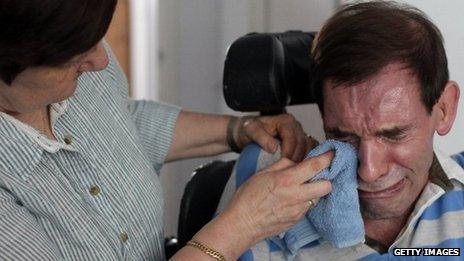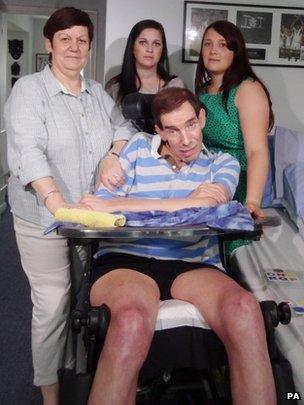Tony Nicklinson's legal fight for right to die
- Published

Tony Nicklinson lost his fight at the High Court for help to end his life
Tony Nicklinson began his fight for the right to die after he said he was "fed up" of living with locked-in syndrome.
The condition left him unable to speak or move and relying on a computer to communicate.
It was caused by a stoke in 2005 which he suffered while on a business trip to Athens and left him paralysed from the neck down.
Mr Nicklinson said he did not want to potentially live with the debilitating syndrome for another 20 years.
One of his daughter's, Lauren, said the stroke had turned him from a "loud, active ex-rugby player" to "someone who's wheelchair bound who watches telly all day".
The father of two and former engineer said he wished the doctors in Greece had left him to die.
"If I had my time again, and knew then what I know now, I would have not called the ambulance but let nature take its course," he said in 2010.
Two years ago he began legal proceedings to clarify whether his wife, Jane, would have been prosecuted for injecting him with a lethal dose of drugs.
His legal team argued that the current murder law would have infringed his right to respect for his private life as part of the European Convention on Human Rights.
Mrs Nicklinson said he wanted to "take his own life at a time that he chooses".
This led to her husband giving evidence before the Commission on Assisted Dying where he said there was a "fundamental injustice with the present law".
"A new law should restore the right of self-determination and would also help to protect those people who need protection," he said.
"Once this is sorted out people like me can die in peace."
The release of the commission's report in 2011 dashed Mr Nicklinson's hopes.
It said there was a "strong case" for allowing assisted suicide but only for people who are terminally ill.
This saw Mr Nicklinson take his case to the High Court where he asked judges to give a doctor a "common law defence of necessity" against any possible murder charge.

Tony Nicklinson died with his wife, daughters and sister by his side
There, his legal team said Mr Nicklinson could face "20 years or more" and he "does not wish to live that life".
But less than a week ago a tearful Mr Nicklinson was told he had lost the case.
He said he was "devastated" and "utterly miserable".
"I am saddened that the law wants to condemn me to a life of increasing indignity and misery," he said.
In his final months he took to social networking site Twitter to tell of the light in his life.
"My wife Jane deserves your collective praise because without her it would be impossible for me to do what I do," he said.
And in one of his final messages he said he was "still down" after the High Court verdict but said his wife and children - Lauren and Beth - were "fantastic".
Following Mr Nicklinson's death, his lawyer said he had been "gutsy, determined and a fighter to the end".
- Published22 August 2012
- Published22 August 2012
- Published16 August 2012
- Published19 June 2012
- Published19 June 2012